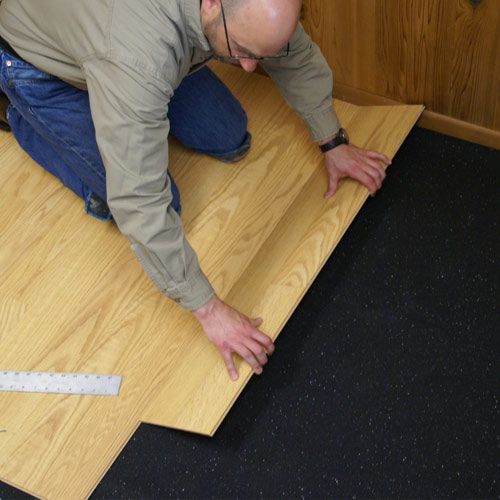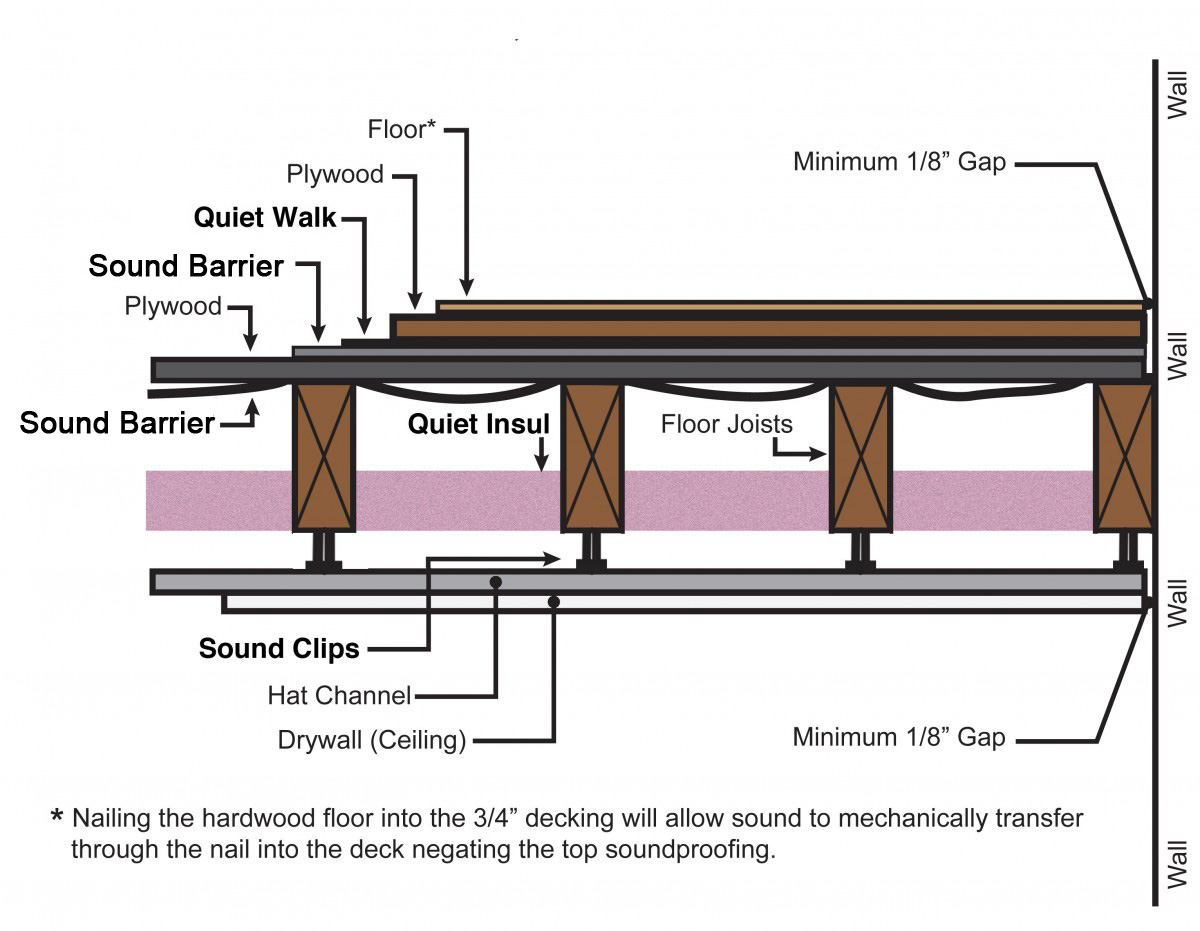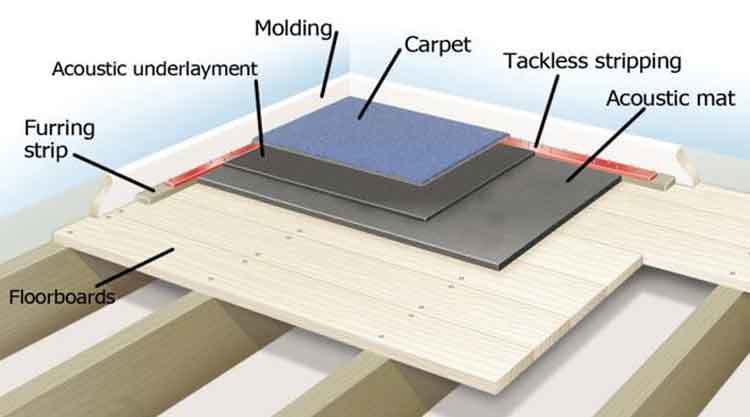Soundproofing a floor in an apartment can be a challenge. Noise from neighbors below can disrupt your peace.
Living in an apartment offers many benefits, but noise can be a big issue. Sounds from footsteps, music, or other activities can travel easily between floors. This can make it hard to relax or enjoy your space. Learning how to soundproof your floor can help create a quieter environment.
It can improve your comfort and even increase your privacy. By using the right materials and techniques, you can effectively reduce noise. This guide will provide practical tips to help you achieve a more peaceful home. Discover how to make your apartment a quieter place to live.

Credit: www.greatmats.com
Introduction To Soundproofing Floors
Living in an apartment can be noisy. Sounds from above or below can disturb your peace. Soundproofing floors helps reduce these unwanted noises. It creates a more comfortable living space. This guide will explore effective methods to soundproof your floors.
The Quest For Peace And Quiet
Noise can come from many sources. Footsteps, music, and conversations can all be loud. These sounds can disrupt your daily life. They can make it hard to relax or focus. Everyone deserves a quiet home.
Soundproofing floors can help achieve this. It creates a buffer against noise. With the right materials, you can enjoy a calm environment. You can finally find the peace you desire.
Benefits Of A Soundproofed Apartment
Soundproofing offers many benefits. First, it improves your comfort. Less noise means better relaxation. It can enhance your quality of life. You can enjoy movies or sleep without interruptions.
A soundproofed apartment also increases privacy. You won’t hear your neighbors, and they won’t hear you. This creates a sense of security in your home.
Lastly, soundproofing can add value to your apartment. Many buyers appreciate quiet living spaces. This feature can make your home more appealing.

Credit: newenglandsoundproofing.com
Assessing Your Floor Situation
Soundproofing a floor in an apartment starts with understanding your current situation. Knowing where noise comes from helps you choose the right solutions. Assessing your floor structure is key. This will guide your soundproofing choices effectively.
Identifying Noise Sources
Begin by noticing where noise enters your home. Is it footsteps from above? Is it loud music or voices? Check for gaps and cracks around doors and windows. These can let in unwanted sounds.
Consider the type of noise. Is it impact noise or airborne noise? Impact noise comes from footsteps or objects falling. Airborne noise comes from voices or music. Knowing the difference helps in finding the right materials.
Evaluating Existing Floor Structure
Examine your floor type. Is it hardwood, tile, or carpet? Each material has different soundproofing needs. Hardwood floors often let sound travel more than carpet.
Look under the floor if possible. Check for insulation or subflooring. This can affect sound transmission. A solid subfloor can help reduce noise. If it’s weak or thin, consider adding more materials.
Check the floor height. A higher floor may create more sound issues. Lower floors might need different treatments. Assessing these factors helps in making an informed decision.
Key Materials For Floor Soundproofing
Choosing the right materials is crucial for effective floor soundproofing. Each material has unique properties that help reduce noise. Here are some top materials to consider.
Acoustic Underlay
Acoustic underlay is a popular choice for soundproofing floors. It is made from soft, dense materials that absorb sound. This helps to minimize noise from footsteps and other vibrations.
- Easy to install under any flooring type.
- Reduces impact noise significantly.
- Available in various thicknesses for different needs.
Interlocking Floor Mats
Interlocking floor mats provide a simple solution for soundproofing. They are made from foam or rubber and fit together easily. These mats can be placed over existing floors.
- Great for temporary setups.
- Provide cushioning and comfort.
- Available in various colors and designs.
Mass Loaded Vinyl
Mass loaded vinyl (MLV) is a heavy material used for soundproofing. It blocks sound due to its density. MLV can be installed under flooring or used as a barrier.
- Highly effective at reducing noise transmission.
- Flexible and easy to cut to size.
- Can be used in various applications beyond floors.
Diy Soundproofing Techniques
Soundproofing your apartment floor can improve comfort. It reduces noise from neighbors. DIY methods are often simple and affordable. Let’s explore some effective techniques.
Installing Carpet And Padding
Carpet is a great sound barrier. It absorbs noise well. Start by choosing a thick carpet. Look for one with a high density.
Padding also plays a key role. Use thick foam or rubber padding. This will further dampen sound. Install the carpet over the padding for best results.
Adding Mass To The Floor
Adding mass can block sound. Use materials like plywood or cement board. Lay these materials on the floor. This extra weight helps reduce noise.
Consider adding rugs or heavy furniture too. They can absorb sound waves. Place them strategically in your room.
Using Acoustic Sealants
Sealants are useful for cracks. Fill gaps between the floor and walls. This prevents sound from leaking through. Choose a quality acoustic sealant.
Apply it around baseboards and other joints. Make sure to smooth it out. This will create a tight seal.
Professional Soundproofing Solutions
Soundproofing a floor in an apartment can be tricky. Many options exist. Professional solutions offer effective results. They help reduce noise from above or below. Here are some common methods.
Floating Floors
Floating floors are a popular choice. These floors do not attach directly to the subfloor. Instead, they rest on a layer of soundproofing material. This design minimizes noise transfer. Various materials can serve as the underlayment, like foam or rubber. Floating floors are easy to install. They can also improve comfort while walking.
Isolation Techniques
Isolation techniques are crucial for effective soundproofing. One common method is using sound isolation clips. These clips separate the floor from the subfloor. This setup reduces vibrations. Another option is using resilient channels. They help absorb sound waves. Insulation can also be added between floor joists. This extra layer dampens noise significantly.
Hiring A Soundproofing Specialist
Hiring a soundproofing specialist can simplify the process. They assess your space and needs. A professional can recommend the best solutions. They have experience with various techniques. This helps ensure a successful outcome. The cost may vary, but the results are often worth it.

Credit: soundproofingguide.com
Maintenance And Upkeep
Keeping your soundproof floor in good shape is key. Regular care ensures it stays effective. Simple steps can help maintain your soundproofing. Let’s explore how to do this easily.
Regular Inspections
Check your floor regularly for any issues. Look for cracks or gaps in the soundproofing material. These can let noise through. Inspect the floor covering too. Ensure it remains intact and secure. Early detection can save time and money.
Handling Wear And Tear
Over time, soundproofing materials can wear out. Replace any damaged sections promptly. Use high-quality materials for repairs. This keeps your floor effective against noise. Maintain the floor covering as well. Clean it often to avoid buildup. Dirt can impact soundproofing performance.
Upgrading Soundproofing Over Time
Consider upgrading your soundproofing materials. New options often provide better results. Research the latest products available. Choose those that fit your needs. Regular upgrades can enhance your living space. A well-maintained floor ensures peace and quiet.
Legal Considerations And Neighbor Relations
Soundproofing your apartment floor involves more than just materials. Legal rules and neighbor relations matter. Knowing these aspects helps avoid conflicts. Building rules can influence your soundproofing methods. Respecting your neighbors is equally important. Good relations make living in an apartment easier.
Understanding Apartment Regulations
Each apartment has specific regulations. Check your lease agreement. It often includes rules about noise levels. Some buildings restrict heavy flooring materials. Others may require specific soundproofing methods.
Contact your landlord or property manager for details. They can provide guidelines on acceptable materials. Some apartments may allow carpets. Others might prefer soundproofing underlays. Be aware of these regulations before starting your project.
Communicating With Neighbors
Talk to your neighbors before making changes. They will appreciate your consideration. Share your plans to soundproof the floor. Explain why it’s important to you. Ask if they have experienced noise issues.
Open communication can prevent misunderstandings. Your neighbors might offer helpful suggestions. They may also share their concerns. Building a good rapport with them is key.
Supplemental Soundproofing Tips
Soundproofing a floor in an apartment can be tricky. Various methods help reduce noise. Here are some supplemental tips to enhance your soundproofing efforts. These tips focus on decor and managing ambient noise.
Soundproofing Decor Ideas
Decor can play a role in soundproofing. Soft materials absorb sound waves effectively. Use thick carpets or rugs on your floor. They can reduce noise from footsteps and echoes.
Heavy curtains also help. They block sound from windows. Choose fabric with a dense weave. Wall hangings made of fabric can absorb sound too.
Consider adding bookshelves filled with books. They act as barriers to noise. Place them against shared walls for better results.
Managing Ambient Noise
Ambient noise can be annoying. Identify the sources of noise in your apartment. Use white noise machines to drown out unwanted sounds. They create a constant background sound.
Seal gaps around doors and windows. This step prevents noise from entering. Weather stripping is a simple solution. It can make a big difference.
Consider rearranging furniture. Place larger pieces against shared walls. This can help block sound from neighbors. Think about adding plants. They can absorb sound while improving air quality.
Frequently Asked Questions
How Can I Reduce Noise From Below My Apartment?
To reduce noise from below, consider installing soundproofing materials like acoustic panels or underlayment. Carpets and rugs can also help absorb sound. Additionally, sealing gaps around doors and windows with weather stripping can minimize noise infiltration. These methods create a quieter living environment effectively.
What Materials Are Best For Soundproofing Floors?
The best materials for soundproofing floors include mass-loaded vinyl, cork, and rubber underlayment. These materials effectively block sound transmission. Additionally, using thick carpets or rugs can absorb impact noise. Combining these materials can greatly enhance soundproofing in your apartment.
Can I Soundproof A Floor Without Renovations?
Yes, you can soundproof a floor without major renovations. Use area rugs or carpets to absorb sound. Adding furniture like bookshelves can also help. Consider using soundproof mats or acoustic tiles for an effective solution. These methods are simple and do not require extensive changes.
Is Soundproofing An Apartment Floor Expensive?
Soundproofing an apartment floor can vary in cost. Budget-friendly options include rugs and carpets. More expensive solutions involve professional installation of soundproof underlayment. Overall, you can find a solution that fits your budget and effectively reduces noise.
Conclusion
Soundproofing your apartment floor can make a big difference. It reduces noise and creates a more peaceful environment. Use carpets, rugs, or soundproofing mats for effective results. Adding insulation also helps block sound. Choose the right materials based on your needs.
The process may take time, but the benefits are worth it. Enjoy a quieter home and better living experience. Start your soundproofing journey today for a calm and serene atmosphere. Your neighbors will thank you too.

